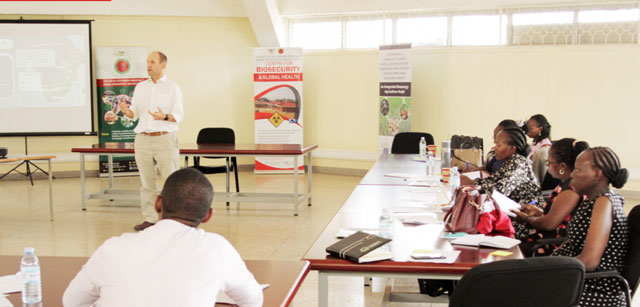
Promotes ‘One Health’ approach to engage frontline communities
Kampala, Uganda | RONALD MUSOKE | Uganda has embraced the ‘One Health’ approach in order to be able to predict, prepare and effectively respond to public health challenges.
Clovice Kankya, an Associate Professor at Makerere University says the “One Health approach” entails collaboration of multiple disciplines working locally, nationally, and globally, to attain optional health for people, animals, and the environment.
Prof. Kankya was on March 20 speaking to The Independent on the sidelines of a symposium on One Health organised at the university.
He said when outbreaks of highly infectious diseases such as Ebola, Anthrax, Marburg, rabies, Rift Valley Fever, and Crimean Congo haemorrhagic fever occur, they often overwhelm health systems and devastate economies. He said that is why Makerere University is taking the lead in the search for innovative ways of fighting back against highly infectious diseases, including engaging communities to learn how these diseases spread.
Prof. Kankya referred to what happened with Ebola in Mubende, noting that Uganda is a hotspot for emerging and re-emerging diseases thanks to its geographical location in Africa but also the ever-growing close interaction between humans, animals (both domestic and wild) and the environment.
Prof. Kankya who teaches at the Department of Biosecurity, Ecosystems and Veterinary Public Health in the College of Veterinary Medicine, Animal Resources and Biosecurity told The Independent that the university is trying to entrench the One Health approach into communities through community schools thanks to a four-year project known as “Capacitating One Health in Eastern and Southern Africa” (COHESA).
Kankya who doubles as the Team Lead of the project in Uganda said the four-year project is also being implemented in 11 other countries in eastern and southern Africa including; Ethiopia, Kenya, Rwanda, Somalia, and Tanzania as well as Botswana, Malawi, Mozambique, Namibia, Zambia and Zimbabwe in southern Africa.
Supported by the European Union-funded Organization of African, Caribbean and Pacific States (OACPS) Research and Innovation Programme, it is aimed at “generating an inclusive and innovative ecosystem, facilitating rapid uptake, adaptation, and adoption of solutions to issues that can be dealt with using a One Health approach.
It is also intended to increase the relevance of One Health research and policies in eastern and southern Africa; enhance national and sub-regional cross-sectoral collaboration between the government entities with One Health mandates and One Health stakeholders across society; equip educational and research institutes to train the next generation of One Health workforce as well as increase the capacity of government and non-governmental stakeholders to identify and deliver One Health solutions to solve key problems.
Prof. Kankya explained why the “One Health” approach is gaining traction among public health experts. He pointed to the many public health challenges around the world which are increasing at an alarming rate. “We have diseases coming from animals into humans; we are also seeing an increasing use of chemicals and drugs to treat diseases in plants, humans and animals and all these are ultimately not only ending up in our environment but also in our bodies.”
“At Makerere University, we can code from a node of training and capacity build ing. So, this project comes in handy, to
build on several initiatives the university is already undertaking, for instance, teaching and research as well as community outreaches.”
Spreading knowledge at the grassroots
According to an international panel composed of multi-disciplinary experts from around the world, “One Health” refers to an “integrated unifying approach that aims to sustainably balance and optimise the health of people, animals and ecosystems.”
It recognises that the health of humans, domestic and wild animals, plants and the wider environment are closely linked and inter-dependent and this is why the approach seeks to mobilise multiple sectors, disciplines and communities at varying levels of society to work together to foster the well-being and tackle threats to public health and the environment.
In Uganda, Makerere University is working with the Young and Old Persons Integrated Development Programme, a community-based organisation found in the western district of Bunyangabu.
“We chose this CBO because it is an enclave district which is in the middle of Queen Elizabeth National Park, Kibaale National Park and Rwenzori National Park,” said Prof. Kankya.
“This district is at the centre of the three national parks and it’s like a focal point if you want to tap into the human-wildlife interface,” he said, “It’s also enroute to DR Congo and we are looking at these communities because of their love and interest in game meat.”
Prof Kankya told The Independent that launching their pilot outreach with communities in Bunyangabu District would hopefully create a mindset change. “We have gone to selected community schools, both primary and secondary, selected teachers whom we call ‘One Health mentors;’ and each teacher has a group of pupils called ‘One Health ambassadors’ who are then taught about the One Health concept,” he said.
“In sub-Saharan Africa, children form the bulk of (the general) population. When school children go back home after school, they interact with the elders who have remained at home. You find that a homestead has four, five, seven or ten school children. So, they bring home the same message about loving animals, safety and loving our trees.”
“We hope that 20-30 years when this project is done and we are no longer professors in these universities, these children will understand what One Health is all about.”
Growing burden of infectious diseases
Globally, about 75% of newly emerging infectious diseases and 60% of all human infections are of animal origin (zoonoses). According to the World Health Organisation (WHO), one or more new infectious diseases have emerged each year since the 1970s.
This has resulted from closer proximity of animals and humans than ever before due to several factors including; human population growth, urbanization, advances in transport and animal industry, deforestation and climate change.
This close interaction has led to increased transmission and quick spread of diseases from animals to humans, resulting into epidemics that can potentially overwhelm health systems, and devastate economies, lead to morbidity and mortality of both animals and humans.
Theo Knight-Jones, a Senior Scientist at the International Livestock Research Institute (ILRI) is the project lead of the COHESA project. He told The Independent that managing of emerging diseases across Africa is a priority issue.
“The whole world experienced the damage COVID-19 did at the pandemic level but even at an individual country level, to have an emerging infectious disease has a massive impact on the health system but also the economy.” “It’s therefore a priority to try to efficiently deal with these threats when they emerge, identify them early and be able to minimize their impact. The need for better One Health governance and delivery was right there during the COVID-19 pandemic,” said Knight-Jones.
“Having government systems and strategies in place ready to deal with these issues when they emerge; and not having to react on the backfoot is important. So, having systems not only at the central government level but also dominate the local level.”
Musa Ssekamatte, the National One Health Platform Coordinator said the government of Uganda takes the One Health approach seriously and that is why it has already established the National One Health Platform to coordinate all One Health activities across the country.
The platform includes two representatives each from the Ministry of Health, the Ministry of Water and Environment, the Ministry of Agriculture, Animal Industry and Fisheries as well as the Uganda Wildlife Authority–the national agency that is responsible for the conservation of the country’s wildlife resources.
Officials in each of these agencies are responsible for updating the national platform of what’s happening in their sectors. However, at a lower level, the districts have One Health teams where these diseases often begin from. “All these officers are working together to support, contain, control and prevent all the challenges that are being brought about by the One Health challenges in the country.”
Betty Mbolanyi, the Principal Environmental Officer in the Ministry of Water and Environment who also doubles as the One Health Focal Person in the ministry says it is important for people to understand that anything they do has a direct or indirect impact on the health of the environment.
“This is why the sector of water and environment is an important aspect in the “One Health” approach because if we compromise the ecosystem integrity, we are going to have issues,” she said.
“We are for, instance, using agro-chemicals to spray our crops but also these are not being broken down, and they end spilling into our soils and water sources which are important for our livelihoods.”
“I know that human beings often take precedence in whatever programmes we come up with but we need to really advocate for the role the environment plays in the One Health approach because if we don’t prevent, we are bound to get more of what we are experiencing right now.
 The Independent Uganda: You get the Truth we Pay the Price
The Independent Uganda: You get the Truth we Pay the Price




